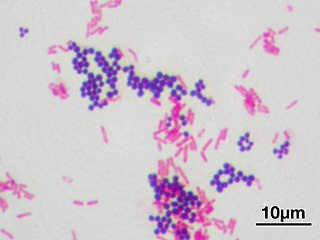Related Research Articles

Tuberculosis (TB), also known colloquially as the "white death", or historically as consumption, is an infectious disease usually caused by Mycobacterium tuberculosis (MTB) bacteria. Tuberculosis generally affects the lungs, but it can also affect other parts of the body. Most infections show no symptoms, in which case it is known as latent tuberculosis. Around 10% of latent infections progress to active disease which, if left untreated, kill about half of those affected. Typical symptoms of active TB are chronic cough with blood-containing mucus, fever, night sweats, and weight loss. Infection of other organs can cause a wide range of symptoms.

An asymptomatic carrier is a person or other organism that has become infected with a pathogen, but shows no signs or symptoms.

Tropical medicine is an interdisciplinary branch of medicine that deals with health issues that occur uniquely, are more widespread, or are more difficult to control in tropical and subtropical regions.

Crimean–Congo hemorrhagic fever (CCHF) is a viral disease. Symptoms of CCHF may include fever, muscle pains, headache, vomiting, diarrhea, and bleeding into the skin. Onset of symptoms is less than two weeks following exposure. Complications may include liver failure. Survivors generally recover around two weeks after onset.
A genital ulcer is an open sore located on the genital area, which includes the vulva, penis, perianal region, or anus. Genital ulcers are most commonly caused by infectious agents. However, this is not always the case, as a genital ulcer may have noninfectious causes as well.

JN-International Medical Corporation (JNIMC) is a U.S.-based biopharmaceutical corporation which since 1998 has been focused on developing vaccines and diagnostics for infectious disease for developing countries. This private corporation was founded in 1998 by Dr. Jeeri R. Reddy with the help of Dr. Kelly F. Lechtenberg in a small rural town, Oakland, Nebraska. From there it grew and expanded until in the year 2000 the corporation moved to Omaha, Nebraska.

The Emerging Pathogens Institute (EPI) is an interdisciplinary research institution associated with the University of Florida. The institute focuses on fusing key disciplines to develop outreach, education, and research capabilities designed to preserve the region's health and economy, as well as to prevent or contain new and re-emerging diseases. Researchers within the institute work in more than 30 different countries around the world, with over 250 affiliated faculty members stemming from 11 University of Florida colleges, centers, and institutes. The 90,000-square-foot building includes laboratories and collaborative space for bioinformatics and mathematical modeling.

Meningitis is acute or chronic inflammation of the protective membranes covering the brain and spinal cord, collectively called the meninges. The most common symptoms are fever, intense headache, vomiting and neck stiffness and occasionally photophobia.

Antibiotic misuse, sometimes called antibiotic abuse or antibiotic overuse, refers to the misuse or overuse of antibiotics, with potentially serious effects on health. It is a contributing factor to the development of antibiotic resistance, including the creation of multidrug-resistant bacteria, informally called "super bugs": relatively harmless bacteria can develop resistance to multiple antibiotics and cause life-threatening infections.
In Norway, municipalities are in charge of providing basic healthcare. Since the money given to municipalities is not set aside for any particular purpose, each municipality is free to determine its own health budget. Municipalities coordinate primary healthcare services through agreements with independent physicians. In Norway, private healthcare providers are not compensated unless they have a contract with the public health service.

The Infectious Diseases Hospital “Dr. Francisco Javier Muñiz" is a public metropolitan-area hospital serving Buenos Aires, Argentina and the surrounding area since 1882. As the name implies, the hospital specializes in infectious diseases. The address for the hospital is Uspallata 2272 and is located in the neighborhood of Parque Patricios in Buenos Aires.

Sir Alimuddin Zumla,, FRCP, FRCPath, FRSB is a British-Zambian professor of infectious diseases and international health at University College London Medical School. He specialises in infectious and tropical diseases, clinical immunology, and internal medicine, with a special interest in HIV/AIDS, respiratory infections, and diseases of poverty. He is known for his leadership of infectious/tropical diseases research and capacity development activities. He was awarded a Knighthood in the 2017 Queens Birthday Honours list for services to public health and protection from infectious disease. In 2012, he was awarded Zambia's highest civilian honour, the Order of the Grand Commander of Distinguished services - First Division. In 2023, for the sixth consecutive year, Zumla was recognised by Clarivate Analytics, Web of Science as one of the world's top 1% most cited researchers. In 2021 Sir Zumla was elected as Fellow of The World Academy of Sciences.

Pneumonia is a common respiratory infection, affecting approximately 450 million people a year and occurring in all parts of the world. It is a major cause of death among all age groups, resulting in 1.4 million deaths in 2010 and 3.0 million deaths in 2016.
In biology, a pathogen, in the oldest and broadest sense, is any organism or agent that can produce disease. A pathogen may also be referred to as an infectious agent, or simply a germ.

The stages of HIV infection are acute infection, latency, and AIDS. Acute infection lasts for several weeks and may include symptoms such as fever, swollen lymph nodes, inflammation of the throat, rash, muscle pain, malaise, and mouth and esophageal sores. The latency stage involves few or no symptoms and can last anywhere from two weeks to twenty years or more, depending on the individual. AIDS, the final stage of HIV infection, is defined by low CD4+ T cell counts, various opportunistic infections, cancers, and other conditions.

A superspreading event (SSEV) is an event in which an infectious disease is spread much more than usual, while an unusually contagious organism infected with a disease is known as a superspreader. In the context of a human-borne illness, a superspreader is an individual who is more likely to infect others, compared with a typical infected person. Such superspreaders are of particular concern in epidemiology.

Ebola, also known as Ebola virus disease (EVD) and Ebola hemorrhagic fever (EHF), is a viral hemorrhagic fever in humans and other primates, caused by ebolaviruses. Symptoms typically start anywhere between two days and three weeks after infection. The first symptoms are usually fever, sore throat, muscle pain, and headaches. These are usually followed by vomiting, diarrhoea, rash and decreased liver and kidney function, at which point some people begin to bleed both internally and externally. It kills between 25% and 90% of those infected – about 50% on average. Death is often due to shock from fluid loss, and typically occurs between six and 16 days after the first symptoms appear. Early treatment of symptoms increases the survival rate considerably compared to late start. An Ebola vaccine was approved by the US FDA in December 2019.

Infectious diseases or ID, also known as infectiology, is a medical specialty dealing with the diagnosis and treatment of infections. An infectious diseases specialist's practice consists of managing nosocomial (healthcare-acquired) infections or community-acquired infections. An ID specialist investigates and determines the cause of a disease. Once the cause is known, an ID specialist can then run various tests to determine the best drug to treat the disease. While infectious diseases have always been around, the infectious disease specialty did not exist until the late 1900s after scientists and physicians in the 19th century paved the way with research on the sources of infectious disease and the development of vaccines.
Harriet Mayanja-Kizza, MBChB, MMed, MSc, FACP, is a Ugandan physician, researcher, and academic administrator. She is the former Dean of Makerere University School of Medicine, the oldest medical school in East Africa, established in 1924.

The Edinburgh City Hospital was a hospital in Colinton, Edinburgh, opened in 1903 for the treatment of infectious diseases. As the pattern of infectious disease changed, the need for in-patients facilities to treat them diminished. While still remaining the regional centre for infectious disease, in the latter half of the 20th century the hospital facilities diversified with specialist units established for respiratory disease, ear, nose and throat surgery, maxillo-facial surgery, care of the elderly and latterly HIV/AIDS. The hospital closed in 1999 and was redeveloped as residential housing, known as Greenbank Village.
References
- 1 2 "About Us" . Retrieved 2020-07-30.
- ↑ "Tidsskriftet Michael: Kibong'oto: The History of Global Tuberculosis Control seen through Local Archives" . Retrieved August 3, 2020.
- ↑ "Kibong'oto Hospital builds modern viral infections lab" . Retrieved August 3, 2020.
- ↑ "East Africa: Kibong Oto Hospital Eyes Expansion Into EA - allAfrica.com" . Retrieved August 3, 2020.
- ↑ "Dailynews" . Retrieved August 3, 2020.[ permanent dead link ]